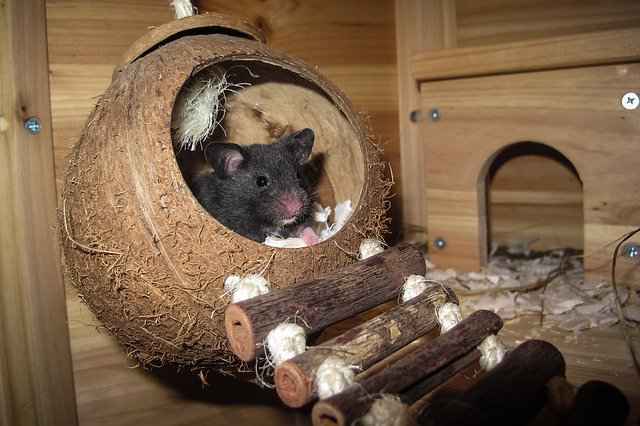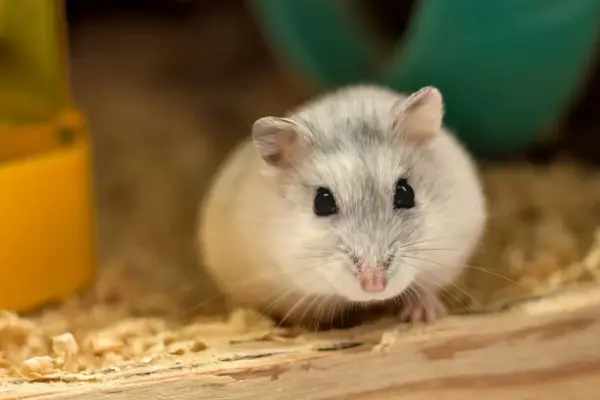Why Is My Hamster Sleeping At Night: 9 Common Reasons

Hamster owners are always asking why is my hamster sleeping at night while it is supposed to be awake and active.
This article is about the many different reasons why hamsters may have trouble going to sleep at night.
We will include information on how to help your hamster get more comfortable, and sleep better at night.
A common question from owners of pet hamsters is, “Why does my hamster sleep all day and night?”
Hamsters are crepuscular animals; this means they sleep during the day and are active at night.
In captivity, a hamster’s schedule can be altered as a result of humans providing them with food and shelter during the day.
This will cause the hamster to go into a hibernation-like state during periods where there is no food or light.
To help your hamster stay active and healthy, make sure it gets enough time in the sun for exercise as well as proper nutrition.
Why Is My Hamster Sleeping At Night
Hamsters are nocturnal animals that are always busy and active at night, there are many reasons why a hamster might sleep at night. These include age, illness, stress, frustration, anxiety, or an emotional state such as depression, their living situation, and even what time of year it is.
If you think there might be something wrong with your hamster’s health or other causes of stress that are causing unusual sleeping habits, please speak with a vet or qualified professional as soon as possible.
It can be difficult to understand why your hamster is sleeping so much during the day and then awake at night.
This is a common question, but there are many reasons why this may be happening.
There are different times in life when your hamster will sleep more or less or both. They also vary in their habits throughout the year.
It’s important to know that the answer to this question will depend on the age and sex of your hamster, their living situation, and even what time of year it is.
Dwarf hamsters and Chinese hamsters tend to be more flexible about their sleep schedules than Syrians.
Hamsters are genetically programmed to be nocturnal, but they can be kept awake by too much stimulation.
Try putting your hamster’s living environment in a calm, quiet area of your house, and make sure children and pets leave him alone during the day.
9 Reasons why hamsters sleep at night
Here are some reasons why a hamster is always sleeping at night when the hamster should be awake:
A sick hamster will sleep at night
Illness is one of the major reasons why hamsters sleep at night because generally hamsters are known to be active at night.
Diarrhea and constipation are the common illnesses hamsters have and these can make your hamster very weak and tired.
Once your hamster is weak, the next thing is sleeping unnecessarily when it should be awake.
You can notice it in your hamster feeding pattern, behavior, and poop. If your hamster continues sleeping at night when it should be awake, please see a vet.
Living condition and temperature
Despite their fluffy coats, hamsters do not do well in frigid weather. Even extremely high conditions can be fatal to your hamster.
Hamsters, like reptiles and fish, require a specific temperature range to be healthy.
The incorrect temperature can produce life-threatening colds or heatstroke.
20-24 °C is a nice and good living environmental temperature according to LafeberVet.
Other possibilities are that your hamster is hibernating if the environment is too cold.
If the temperature of your hamster is higher or lower, your hamster may become stressed out and hibernate at night.
The age of the hamster
At a very tender age, hamsters love a lot not minding the time of the day, they only wake up when they need food.
So, if you have a very tender hamster, you shouldn’t worry about sleeping at night at all.
You should only worry if your hamster is no longer young because hamsters are known to be active at night.
Too much stimulation causes hamsters to sleep at night
Too much stimulation can cause unnecessary stress for your hamster, which can lead to your hamster sleeping at night.
Let your hamster do its thing and stop hanging around your hamster when It’s supposed to be sleeping.
When your hamster is sleeping during the day, let it be, because at night your hamster can continue sleeping since you disturbed it during the day.
Keep away anything that may lead to overstimulation of your hamster as this can lead to your hamster sleeping at night.
Emotional state such as depression
Depression alone can push a hamster to hibernate, as well as cause your hamster to sleep in odd hours.
Stress and change of routine or change of bedding can cause depression in hamsters, which can lead to unnecessary hibernation.
Stick to what is working for you and your hamster, stop changing things every day after day.
A depressed hamster is always unstable and can bite unnecessarily.
A depressed hamster can also sleep at night when it should be awake at night.
Too much stress during the day causes hamsters to sleep at night
When you talk about stress, too much noise in your house is a good example of stress for your hamster.
Too much stress during the day can cause your hamster to stay awake during the day and sleep at night.
Your hamster may be sleeping during the and once your kids are back from school, they will wake your hamster up.
Then at night when your hamster should be at work, then your hamster will be sleeping because your hamster didn’t sleep during the day.
Constant or persistent changing of routine
This causes depression or anxiety for your hamster when keep changing things from one time to another.
Hamsters do get frustrated and can hibernate, so you need to stick to what is working.
Stop changing mealtime and cage location every day, make sure once your hamster settles in a specific routine you stick to it.
Changes in routine can keep a hamster awake when it should be sleeping and then sleeping when it should be awake.
Waking up your hamster in odd hours during the day
Waking a sleeping hamster or a sleepy hamster might lead to aggressive behavior and a bite from your hamster.
If you need to interact with your hamster when he is sleeping, speak softly to him and lightly blow on him until he wakes up and notices you.
You can sometimes wake up your hamster to communicate with him, but frequent disturbances may cause your pet to become irritable, grumpy, and unhappy.
Allowing your hamster to sleep when he wants and engaging with him when he is up is great for him.
Waking up your hamster at odd hours could also lead to your hamster sleeping during odd hours as well.
Lack of activities to carry out at night
Most breeds of hamsters are very active, and always need lots of activities to carry out when they are awake at night.
Not providing your hamster with play toys or something to do mostly at night can make a hamster bored or frustrated.
Most hamsters start destroying things when lonely or bored, while some will go ahead and take their nap.
If you notice your hamster is sleeping at night and not active, it could be that the hamster lack activities or play toys.
How to train your hamster to sleep during the day
Here are some simple and common ways to get a hamster to sleep at night:
Increase the bond between you and your hamster
Establish a positive relationship with your hamster. Feed your hamster frequently and play with it on a regular basis.
Once your hamster has become accustomed to you, it will begin to enjoy your company and anticipate seeing you on a daily basis.
This will make altering their sleeping patterns more pleasurable and less unpleasant.
Keep open light away from your hamster during the day
During daylight hours, turn off the lights. You’ll have to fool your hamster into thinking it’s a night when it’s actually day.
This may be accomplished in a variety of methods, including the use of light-blocking curtains, the placement of their cage in a closet, or the use of a blanket as a light shield over their cage.
This will also make your hamster feel relaxed and sleep off during the day because hamsters are not a big fan of light.
Stick to the routine that is working
Maintain a consistent schedule.
Trying to shift a hamster’s sleep pattern to the full opposite is similar to trying to modify your own; it’s a process that requires habitual scheduling.
When blocking light from the hamster during the day, make sure you follow the correct timetable.
Changing this timeline might risk the entire procedure and possibly derail your ambitions.
Take your time and train your hamster to sleep during the day
Throughout the training period, be patient. It may take several months for your hamster to adjust to its new routine.
Interact with your hamster on a daily basis to encourage it to remain away throughout the day.
Feeding your hamster snacks or treats, putting it on an exercise ball, or removing it from its cage can all help.
Make sure there is no strong illumination from the outside in any rooms where the hamster will go.
More recommended articles on hamsters:
- What Fruits Can Hamsters Eat: 12 Safe Fruits & Guidelines.
- Are Hamsters A Good Pet: 24 Hamster Pros & Cons.
- Are Hamsters Dangerous: 12 Bad Things About Hamsters.
- Are Hamsters Easy To Take Care Of: The 13 Full Guide.
How much should a hamster sleep?
A hamster requires between 6 and 8 hours of sleep on average. This is a net total of how much sleep a hamster should get in a day, implying that they may be able to disrupt their sleep cycles.
Every disruption during a sleeping cycle of a hamster may be seen as stress for the hamster.
Final thoughts
Hamsters sleep at various times throughout the day, so it’s easy to assume they’re constantly asleep.
This is not always the case, as they can be awake for up to 16 hours every 24-hour cycle.
If you see anything more than this, it might be a sign of sickness or hibernation.
If you suspect sickness, make sure you have a warm environment (above 20 °C) and go to the vet.





![Can Hamsters Get Cold [Detailed Answer] Can Hamsters Get Cold](https://petcreeks.com/wp-content/uploads/2023/02/Can-Hamsters-Get-Cold-768x555.jpg)
